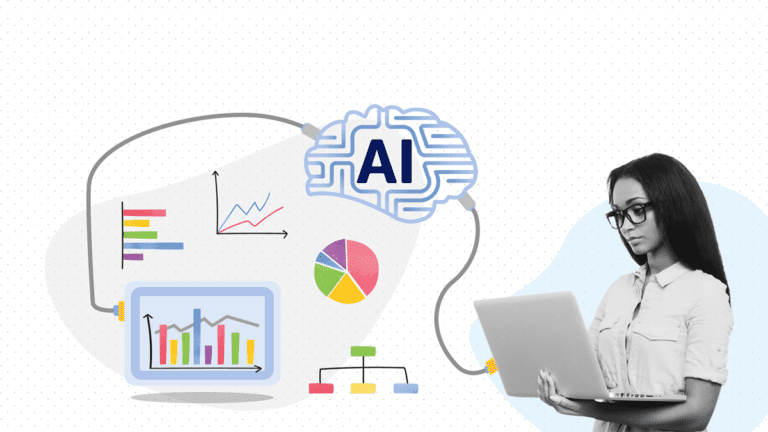Image by rawpixel.com on Freepik
In recent years, Artificial Intelligence (AI) has emerged as one of the most transformative technologies of our time, revolutionising the way businesses operate across various sectors. From automating mundane tasks to enabling advanced data analytics, AI has become an essential tool for improving efficiency, reducing costs, and enhancing decision-making processes. However, with the growing reliance on AI comes the responsibility of using it ethically and ensuring that its application benefits all stakeholders. The responsible use of AI in business requires careful consideration of issues such as bias, transparency, privacy, accountability, and environmental impact.
The Role of AI in Modern Business
AI has already demonstrated its potential to significantly improve business outcomes. In retail, AI-powered systems analyse customer behaviour to personalise shopping experiences, recommending products based on browsing and purchasing habits. In healthcare, AI assists doctors in diagnosing diseases more accurately, while in finance, it enhances risk assessment and fraud detection. Moreover, in industries like logistics and manufacturing, AI-driven automation streamlines operations and improves productivity.
Despite these advantages, the adoption of AI is not without its challenges. As AI systems become more integrated into business processes, they present complex ethical dilemmas that organisations must address. Businesses cannot afford to adopt AI blindly without considering the long-term consequences of its use. To ensure that AI is used responsibly, companies must establish ethical frameworks that guide the development and deployment of these technologies.
Bias and Fairness in AI
One of the most significant ethical concerns surrounding AI is the risk of bias. AI systems are typically trained on vast datasets, and if those datasets reflect historical biases, the AI is likely to perpetuate or even amplify those biases. This issue is particularly prevalent in areas like recruitment, lending, and law enforcement, where biased algorithms can lead to unfair outcomes, such as favouring certain demographic groups over others.
For instance, if an AI model used for hiring decisions is trained on historical data that reflects gender or racial bias, it may unfairly disadvantage certain applicants, perpetuating inequalities in the workplace. To mitigate this risk, businesses must ensure that the data used to train AI models is diverse and representative of all groups. Regular audits and testing of AI systems for bias are essential to ensuring fairness and preventing discriminatory outcomes.
Transparency in AI Decision-Making
Another key ethical issue is the lack of transparency in AI decision-making. AI systems often operate as “black boxes,” meaning that the processes by which they arrive at certain decisions are not easily understandable. This opacity can be problematic, particularly when AI is used in critical areas such as healthcare, finance, or criminal justice, where the reasoning behind decisions must be clear and explainable.
To build trust with customers, employees, and regulators, businesses must strive for greater transparency in how AI systems work. This involves providing clear explanations for AI-driven decisions and ensuring that those affected by these decisions understand the rationale behind them. Transparent AI systems can help mitigate fears of arbitrary or biased decision-making, ultimately fostering greater acceptance of AI technologies.
Privacy and Data Protection
AI systems are heavily reliant on data, often involving the collection and analysis of large amounts of personal information. As businesses increasingly adopt AI, concerns about privacy and data protection have become more pronounced. Regulations such as the General Data Protection Regulation (GDPR) in Europe place strict requirements on how businesses handle personal data, and organisations that fail to comply with these regulations face significant fines and reputational damage.
To use AI responsibly, businesses must prioritise data privacy and ensure that personal data is collected and used in compliance with legal and ethical standards. This includes implementing robust data governance practices, anonymising data where possible, and providing individuals with clear information about how their data will be used. Respecting customers’ privacy rights is not only a legal requirement but also essential for maintaining trust and loyalty.
Accountability in AI
A critical question surrounding AI is: who is accountable when things go wrong? As AI systems take on more complex roles in decision-making, businesses must establish clear lines of responsibility. When an AI system makes an error—such as denying someone a loan or misdiagnosing a medical condition—there must be mechanisms in place to identify the cause of the error and hold the appropriate parties accountable.
This accountability extends beyond technical malfunctions. Businesses must also take responsibility for the ethical implications of AI systems they develop and deploy. Establishing oversight committees or ethical boards can help monitor AI projects, ensuring that they align with the company’s values and ethical standards. Accountability frameworks should also include guidelines for mitigating harm and providing recourse for individuals affected by AI-driven decisions.
The Environmental Impact of AI
In the race to adopt AI, businesses must not overlook the environmental impact of these technologies. AI models, particularly those based on deep learning, require immense computational resources and consume significant amounts of energy. As businesses scale their AI operations, the energy demands of running these systems can contribute to their carbon footprint.
To mitigate the environmental impact of AI, companies should adopt energy-efficient technologies and optimise their data centres to reduce power consumption. Sustainable AI practices can help minimise the carbon footprint associated with AI deployment, aligning technological innovation with environmental responsibility.
Striking a Balance Between Innovation and Responsibility
The rapid advancement of AI presents businesses with both opportunities and challenges. While AI can drive innovation and improve business outcomes, companies must approach its use with caution and responsibility. Striking the right balance between innovation and ethical considerations is key to ensuring that AI benefits society as a whole.
Responsible AI use requires businesses to adopt a proactive approach, embedding ethical principles into the development and deployment of AI systems. This includes addressing issues of bias, transparency, privacy, accountability, and sustainability. Companies that embrace these principles will not only avoid the potential pitfalls of AI but will also gain a competitive edge by building trust with their customers and stakeholders.
The responsible use of AI in business is not just an ethical obligation; it is also a strategic imperative. As AI continues to evolve, businesses that prioritise ethical considerations will be better positioned to succeed in the long term. By ensuring that AI is used responsibly, companies can harness its full potential while safeguarding their reputation and contributing to a fairer, more equitable society.



